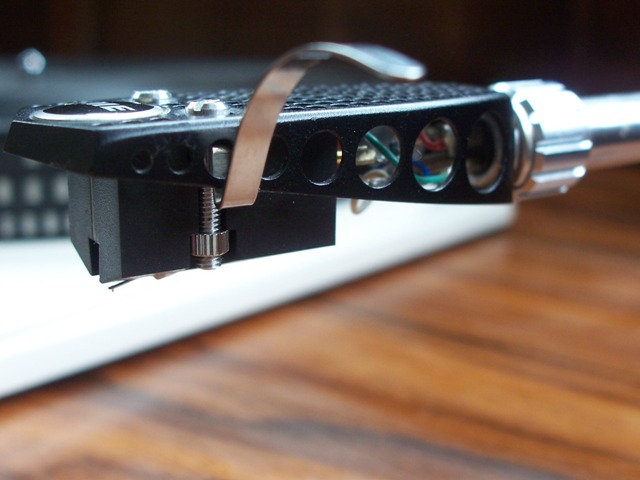-edible zone-
The Cartridge
It is not uncommon for anyone who has an interest in the ‘classic’ combination of the Garrard 301 and SME tone arms to look at vintage style cartridges. The SME instruction booklet shows an SME SPU mounted on the arm and it is widely favoured to use the arm with an Ortofon SPU, or low output MC cartridge. The world of MC cartridges is a mind field and brought about a whole host of additional considerations. I shan’t go into these in detail but matching arm with cartridge was important. After much research I opted for the classic Denon DL103. A safe choice perhaps and again widely recognised for use with this tone arm. The Denon is a relatively affordable cartridge compared to say the vintage Neumanns, Ortofons or London Decca’s; it suits the high mass characteristics of the tone arm and fits the SME style head shells (though I think the squeeze, making fine adjustments are tricky). The cartridge is a conical stylus and rides high in the groove.. if brave, re-tip with an elliptical stylus, dig deeper and have a different kind of fun.

Pre
Many but not all MC cartridges
are thought best served by or requiring a step up transformer to amplify
the low output signal of the cartridge adequately enough to gain line
level input. These are passive devices (with no power supply) that
"transform" the current from the moving coil cartridge into voltage,
which can then be amplified (and equalized) by the phono stage of the
preamplifier. After much research I decided to try the Rothwell MC stage
and give myself some flexibility with a variety of both low output and
high output MC’s as well as some MM cartridges when used in conjunction
with a separate phono stage. Throughout the pulling together this
project, I found this component to be the most difficult to pin down. I
had looked at pre amps and phono stages which had selectable MC inputs
and how these might suit. I stumbled across the cult of the step up
whilst researching valve amps and about what people were doing to
monoblocks that had no phono stage. The transformer is no new idea of
course, although many MC cartridges back in the day carried a
transformer built into the head shell of the cartridge e.g. Ortofon GT.
I may not have satisfied my ambitions for a 'vintage only' system by
buying 'new' but the step up is something of a renaissance component
which harks back to a bygone era when the technology was not so
progressive as it is now. I did however remain true to my interest in
British audio and was happy 'buying local' (Rothwell are just up the
road from me). I also chose to introduce the Cambridge Audio 640P
secondary phono stage, which is switchable between MM and MC for more
flexibility.
Amplifier
J.E. Sugden is again a well
known British audio company, it has all the pedigree of the great names
synonymous with British audio classics like London Decca, SME, Garrard,
Mitchell, Quad, Rogers, Tannoy etc. A small firm with dedication in the
pursuit of fine audio and handmade in Yorkshire, England the place where
I was born. The Sugden A21 Class A Amplifier was conceived in the 1960’s
by J.E. Sugden and was the world’s first commercial solid state class A
Amplifier. It is a wonderfully open amplifier with remarkable results
for its modest 12w/pch. It did of course have all the aesthetic of the
period I liked and looked a fitting choice for early testing of my
Garrard.
